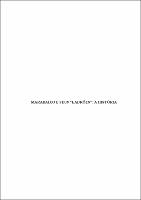Please use this identifier to cite or link to this item:
https://rima.ufrrj.br/jspui/handle/20.500.14407/12672| Tipo do documento: | Dissertação |
| Title: | Marabaixo e seus “ladrões”: a história afroamapaense sintetizada no cancioneiro popular como elemento fomentador de estudos literários |
| Other Titles: | Marabaix and its “thieves”: the Afro-American history synthesized in the popular songbook as a fomenting element of literary studies |
| Authors: | Madureira, Daniel de Nazaré de Souza |
| Orientador(a): | Silva, Wanderley da |
| Primeiro membro da banca: | Silva, Wanderley da |
| Segundo membro da banca: | Sanchez, Liliane Barreira |
| Terceiro membro da banca: | Nascimento, Giovane do |
| Keywords: | identidade cultural;Amapá;afroamapaense;literatura;discurso;cultural identity;Amapá;afroamapaense;literature;speech |
| Área(s) do CNPq: | Artes |
| Idioma: | por |
| Issue Date: | 21-Aug-2019 |
| Publisher: | Universidade Federal Rural do Rio de Janeiro |
| Sigla da instituição: | UFRRJ |
| Departamento: | Instituto de Agronomia |
| Programa: | Programa de Pós-Graduação em Educação Agrícola |
| Citation: | MADUREIRA, Daniel de Nazaré de Souza. Marabaixo e seus “ladrões”: a história afroamapaense sintetizada no cancioneiro popular como elemento fomentador de estudos literários. 2019. 112 f. Dissertação (Mestrado em Educação Agrícola) - Instituto de Agronomia, Universidade Federal Rural do Rio de Janeiro, Seropédica - RJ. 2019. |
| Abstract: | A expressão cultural é o que há de maior valor para resguardar qualquer forma de expressividade humana. No Amapá, o Marabaixo toma forma como expressão máxima de sua cultura, trazendo na sua essência a história do Estado, registrada na sua mais leal e perfeita autenticidade, a música. Os ―ladrões‖ de Marabaixo, canções produzidas e típicas dessa manifestação cultural, retratam a história e a condição do negro no Amapá como em todo o Brasil na sua construção histórica e social. Neste contexto, o objetivo desta pesquisa foi identificar e analisar nas novas produções de ―ladrões‖ de Marabaixo, através do Projeto Cantando Marabaixo nas Escolas, possíveis relações identitárias e históricas dos jovens com o seu Estado. O estudo foi realizado com três escolas, através de entrevistas semiestruturada com os alunos, coordenadores e professores participantes do projeto no ano de 2018, como também, foram analisados discursivamente os antigos e novos ―ladrões‖ de Marabaixo de acordo com o seu viés social. Os resultados apontaram que os alunos, em sua maioria, pouco conheciam a relação do Marabaixo com a construção histórica do Amapá e o projeto veio justamente para agregar neste conhecimento. Os professores e coordenadores do projeto na escola puderam viabilizar de forma lúdica o aprendizado do aluno. A pesquisa trouxe neste sentido, o encontro do indivíduo com a sua própria história, fazendo assim, ele refletir sobre a sua condição como ser e o seu papel como ator social ativo. |
| Abstract: | Cultural expression is what is most valuable in protect any form of human expressiveness. In state of Amapá, Marabaixo takes form as the maximum expression of its culture, bringing in its essence the history of the State, recorded in its most loyal and perfect authenticity, the music. The "ladrões" of Marabaixo, songs produced and typical of this cultural manifestation, depict the history and condition of the Negro in Amapá as in all Brazil in its historical and social construction. In this context, the objective of this research was to identify and analyze in the new productions of "ladrões" of Marabaixo, through the Singing Marabaixo in schools Project, possible identitary and historical cultural relations of young people. The study was conducted in three schools, through semi-structured interviews with students, coordinators and teachers participating in the project in the year 2018, as well as the old and new "thieves" of Marabaixo were analyzed discursively according to their social bias. The results indicated that the students, for the most part, did not know much about Marabaixo's relationship with the historical construction of Amapá and the project came precisely to add this knowledge. The teachers and coordinators of the project at the school were able to playfully make the student's learning possible. The research brought in this sense, the encounter of the individual with his own history, thus making him reflect on his condition as a being and his role as an active social actor. |
| URI: | https://rima.ufrrj.br/jspui/handle/20.500.14407/12672 |
| Appears in Collections: | Mestrado em Educação Agrícola |
Se for cadastrado no RIMA, poderá receber informações por email.
Se ainda não tem uma conta, cadastre-se aqui!
Files in This Item:
| File | Description | Size | Format | |
|---|---|---|---|---|
| 2019 - Daniel de Nazaré de S. Madureira.pdf | 2019 - Daniel de Nazaré de S. Madureira. | 1.53 MB | Adobe PDF |  View/Open |
Items in DSpace are protected by copyright, with all rights reserved, unless otherwise indicated.

